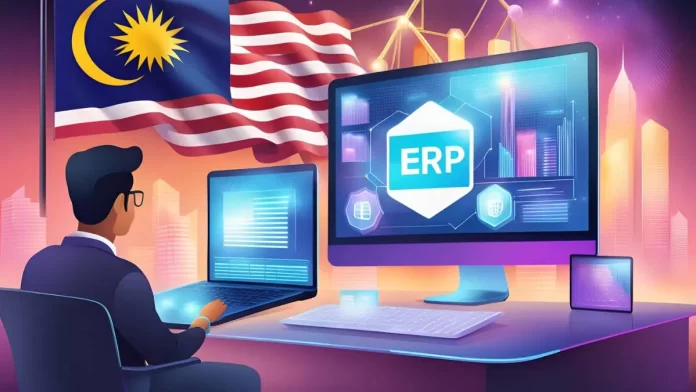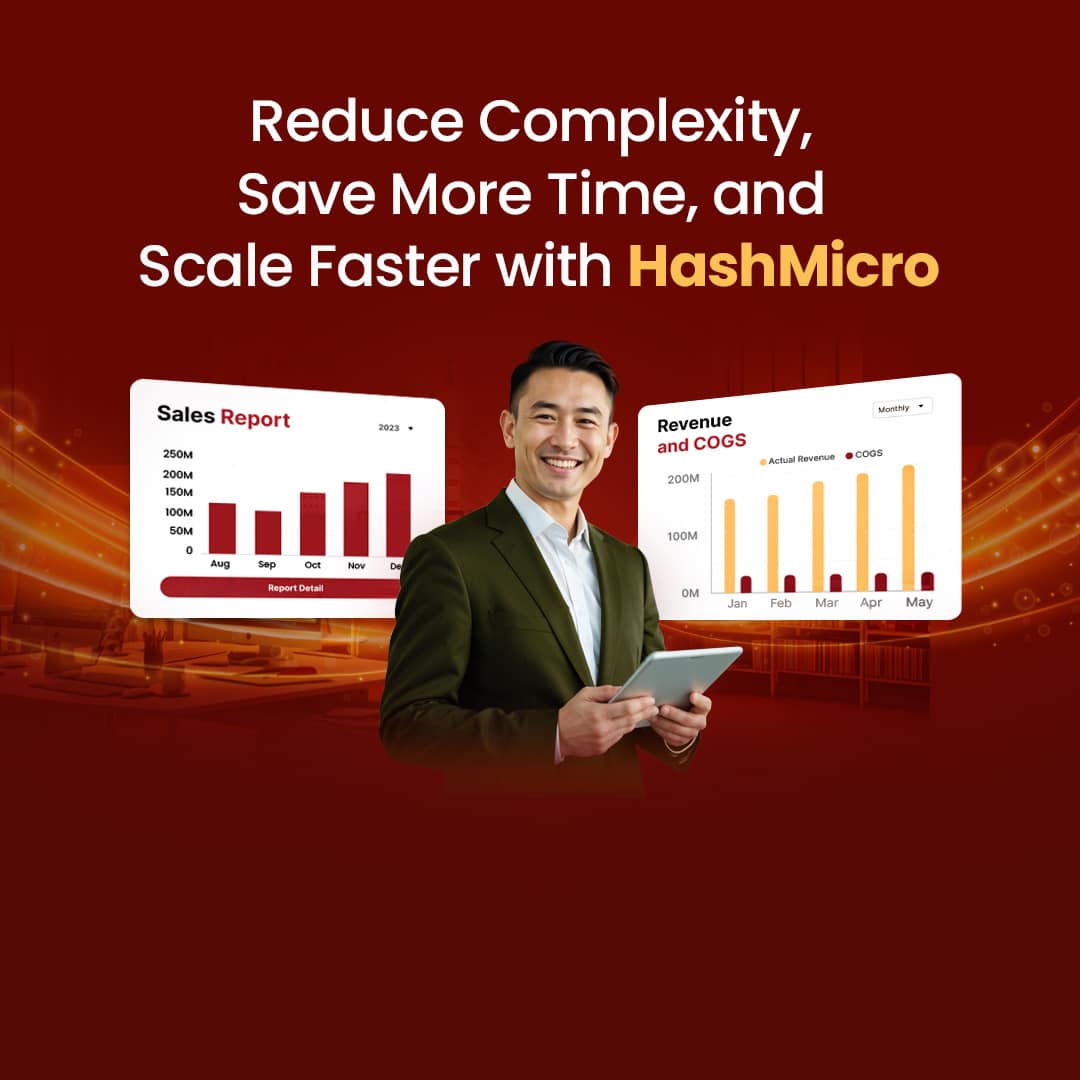E-commerce is booming in Malaysia, significantly advancing the digital economy. The sector grew by 10.4% to an impressive US$62.511 billion (RM291.7 billion) in the first quarter of 2023 alone. In today’s fast-paced business world, a good Enterprise Resource Planning (ERP) system is key to capitalizing on this growth.
An ERP system helps streamline operations and enhances productivity. However, the selection of the right software can be a challenge when there are so many choices available. For Malaysian businesses, knowing the top 10 ERP selection criteria is critical to making a successful choice.
ERP selection criteria are the factors that help you compare and choose the best ERP system for your business. These criteria ensure that the selected ERP system aligns with your company’s specific needs, objectives, and operational requirements.
According to a report by SoftwareConnect, the average cost per user for an ERP system ranges from $1,740 to $9,330 per month. After implementing ERP systems, 49% of companies reported improvements across all business processes, while only 5% reported no noticeable improvements. Given these results, ERP selection is critical, and it’s important to choose carefully.
As we look at the top 10 ERP selection criteria for Malaysian businesses, remember the unique needs of companies in this market.
Table of Content
Content Lists
Key Takeaways
|
1. ERP Scalability and Growth Potential
In today’s fast-changing business world, companies in Malaysia need to pick an ERP system that grows with them. You need a system that can handle more work and adapt as your business grows. This will keep you competitive and set you up for long-term success.
Anticipating expansion needs
As businesses grow, so do their ERP needs. Knowing how to choose the right ERP that can grow with the company is important. This way, companies can avoid the trouble and cost of switching to a new system later.
When looking at ERP options, business leaders should think about:
- The number of users the ERP system can handle
- How well it can manage more data
- How easy it is to add new features and modules
This helps businesses pick an ERP that can support their growth plans.
Modular design and upgrade path
An ERP with a modular design and a clear upgrade path is key for long-term growth. A modular design lets companies tailor the ERP to their specific needs. That makes it easy to add or remove modules as needed, keeping the system in line with the business’s changes.
Also, an upgrade path means the ERP can keep up with new tech and changes in the industry. This lets businesses use the latest trends without a full system change. With an upgrade path, they can stay ahead in the market.
Choosing ERPs with a modular design and clear upgrade paths helps businesses prepare for the future. This way, they can take advantage of new opportunities as they come.
For example, HashMicro ERP software has a wide range of modules that can be customized to suit the needs of your company. The software integrates multiple business functions including finance, inventory, sales, human resources, and many more into a unified platform.
By focusing on ERP scalability, growth potential, and the ability to expand and upgrade, your company can make smart choices. They can pick an ERP that matches their long-term goals.
Continue reading to ERP software Malaysia for the selection process ERP.
2. Evaluating Business Compatibility with ERP Software

Choosing the right ERP system Malaysia for your business is key. You need to check if it fits your company’s unique needs. Look at both the functional needs and the special features of your industry.
Assessing functional requirements
When picking ERP software, make sure it fits your business well. Think about if the software can make your business run smoother. Look at these points:
- Identifying the specific functionalities needed for your operations.
- Seeing if the ERP software matches your current workflows and procedures.
- Check if the system can grow with your business and change as needed.
- Looking at how easy it is to get reports and data to help make decisions.
By looking at these things, you can find ERP software that works well with your business and boosts productivity.
Identifying industry-specific features
It’s also important to check if the ERP software has features for your industry. For example, manufacturing and distribution have their own needs.
When looking at ERP solutions, think about these:
- Does the ERP optimize for your industry, like managing inventory or supply chains?
- Does it include industry best practices to make things run smoother?
Choosing ERP software with these features means it will meet your industry’s unique needs.
3. Vendor Reputation and Experience in Malaysia
Selecting ERP software for your business in Malaysia is key. You should look at the vendor’s reputation and experience in the local market. Their knowledge and expertise can greatly affect the software’s performance and reliability.
An ERP vendor with a good reputation offers many benefits. They know the specific needs and challenges of businesses in Malaysia. They’re familiar with the laws, culture, and industry needs that ERP solutions must meet.
Also, a vendor with a solid track record in Malaysia is reliable and stable. Their experience shows they can deliver quality software and support businesses well during and after setup.
Moreover, a well-known ERP vendor has strong ties with local businesses, partners, and regulatory bodies. This means better integration, easier customization, and access to support and resources for your business.
It’s crucial to research and check the vendor’s reputation. Read testimonials, case studies, and reviews from other Malaysian businesses. This will show how satisfied they are, the vendor’s performance, and if they keep their promises.
In conclusion, when picking ERP software for your business in Malaysia, go for vendors with a strong reputation and lots of experience here. Their knowledge of Malaysia’s unique challenges will make the ERP solution better fit your business needs.
4. Total Cost of Ownership and Budget Considerations
Choosing an ERP system means looking at the total cost and budget. It’s key to understand the licensing models and long-term costs. These factors affect the ERP’s cost and whether it fits your budget.
Understanding licensing models
ERP vendors have different licensing models, each with its costs and terms. It’s important to check these models to find the best fit for your budget and needs.
Some common licensing models include:
- Perpetual license: This model requires a one-time payment for the software license. You also pay for ongoing maintenance and support. It lets you use the software forever.
- Subscription license: With this model, you pay a regular fee to use the ERP software for a certain time. This fee often includes maintenance and support.
- Cloud-based license: Cloud ERP systems are flexible and scalable. You pay a subscription to use the software online. This includes maintenance, upgrades, and support.
Knowing about these models helps you make smart choices for your budget and future goals.
Calculating long-term expenses
It’s important to plan for the long-term costs of an ERP system. This helps you budget for ongoing expenses like:
- Maintenance and support: ERP systems need regular updates and technical help, which costs extra.
- Upgrades and enhancements: ERP solutions need updates to keep up with technology and business needs.
- Training and user adoption: Training and programs help make sure your ERP works well and benefits your business fully.
- Customizations: If your business is unique, you might need to customize the ERP. This can add to the cost.
Planning for these costs helps avoid unexpected expenses and keeps your ERP successful over time.
| Statistic | Insight |
| About 75% of organizations reported supply disruptions | Supply disruptions can impact the total cost of ownership and budget considerations during an ERP implementation. |
| 16% of companies have adjusted their revenue downwards | Adjusting revenue downwards due to supply disruptions can impact the budget and financial viability of ERP projects. |
| The ERP selection process involves evaluating 12 or fewer vendors initially. | Considering a limited number of vendors helps streamline the evaluation process and focus on the most suitable options. |
| An essential step in the ERP selection process is creating a Request for Proposal (RFP) | A well-defined RFP outlines business needs and helps evaluate vendors based on specific requirements. |
| ROI analysis is crucial for authorizing and funding ERP solutions | Calculating the return on investment helps justify the financial investment required for ERP implementation. |
5. User Experience and Interface Design

Choosing the right ERP software means looking at user experience and interface design. A smooth and easy-to-use system boosts productivity and gets more people on board. A system that’s easy to navigate helps employees work better, which helps the business do well.
A good interface makes hard tasks simple, letting users find what they need fast. It also makes it easier for new people to start using the system quickly. Plus, a dashboard that can be customized to each user’s needs makes their job easier and more efficient.
Also, a well-designed interface cuts down on mistakes and makes data more accurate. It shows information clearly, helping users make smart choices. This leads to better work and helps employees meet their goals.
ERP software that works well on mobile devices is key today, with more people working remotely. Being able to use the software on any device means users can work efficiently, no matter where they are.
Investing in a user-friendly ERP interface is key to success. By focusing on user experience, businesses make sure their employees get the most out of the software. This leads to growth and staying ahead of the competition.
6. ERP Implementation and Customization Services
Choosing the right ERP system for your Malaysia business is key. Look for ERP implementation services and ERP customization services. These are crucial for making the ERP work well in your company.
When picking an ERP, think about how it will work with your current systems. ERP systems should easily connect with other software your company uses. This makes sharing data smooth and keeps all departments in sync.
It helps get rid of data silos. This means everyone has the latest information in real time. It also makes reporting more accurate across the company.
Customization to fit business processes
Every business is different, and so should your ERP system. That’s why customization is important. With ERP customization services, you can make the software fit your business needs.
You can change modules, create custom workflows, and adjust the user interface. This ensures the ERP system works just right for your company’s operations.
By making sure the ERP fits with your current systems and customizing it, you can boost your business. Now, let’s look at what to think about when checking ERP technical specs.
7. ERP Selection: Examining Technical Specifications
ERP software selection means looking closely at its technical specs. These specs tell us how well the system works, fits with our IT setup, and performs. It’s key to making sure it meets our needs.
Here are some important things to think about in ERP software selection:
- System architecture: A good ERP system needs a strong, flexible design. It should handle our current and future needs. It must support many users, manage lots of data, and make data easy to find and use.
- Database management: The ERP should have a solid database system. This system keeps data safe, secure, and easy to get to. It should work with various databases and offer tools for moving, backing up, and recovering data.
- Scalability: As we grow, our ERP system must grow with us. It should handle more data, users, and complexity without slowing down. Being able to easily add or reduce capacity is crucial.
- Interoperability: Our ERP needs to work well with other important systems and apps. It should use standard ways of communicating, making data sharing and workflow automation smooth.
It’s also vital that the technical specs match our business goals. The ERP should be adaptable to our unique processes and workflows. This means it won’t need a lot of changes or workarounds.
Looking closely at the technical specs of ERP options helps us make a smart choice. This careful check lowers the chance of picking a system that doesn’t meet our tech needs.
| Technical Specifications | Importance |
| System Architecture | High |
| Database Management | Medium |
| Scalability | High |
| Interoperability | Medium |
8. Data Security and Compliance Features
In today’s digital world, keeping data safe and following the law is key when picking ERP software for businesses in Malaysia. It’s important to follow Malaysia’s privacy laws to keep business info safe and stay legal.
Adhering to Malaysia’s privacy laws
Malaysia has strict privacy laws to protect personal and business data. When looking at ERP software, make sure it meets these laws. The software must have strong data protection, like encrypted storage and secure ways to send data.
The ERP system should also have tools to follow Malaysia’s data privacy laws, like the Personal Data Protection Act (PDPA). These tools include:
- Tools to manage how customer data is used and their choices
- Logs to keep track of who accesses data and what they do with it
- Systems to quickly tell customers about data breaches
Ensuring data integrity and security measures
For businesses, trusting their ERP system’s data is crucial. An ERP with strong data integrity features keeps data safe from unauthorized changes, corruption, and loss. It should have:
- Checks to make sure data is correct and complete
- Systems to track and manage changes to data
- Backups and recovery plans to prevent data loss from system failures or cyberattacks
Also, it’s key to have strong security to stop unauthorized access and protect important info. The ERP software should offer:
- Checks to make sure only authorized users can access the system
- Encryption for data stored and sent
- Systems to find and stop security threats
- Regular updates and patches to fight new threats
By focusing on data security and following the law when choosing ERP software, businesses can keep their data safe and follow Malaysia’s privacy laws.
9. Customer Support and Service Level Agreements
Choosing the right ERP software means looking at the customer support offered. A good support team can make a big difference in your ERP’s success. This part talks about why customer support and service level agreements (SLAs) matter in picking ERP software. We’ll look at how to check the quality of support and the benefits of guarantees after you start using it.
Evaluating response time and support quality
Good customer support is key for solving problems with your ERP software. It’s important to check how fast and well the vendor responds to your needs. Look for these signs:
- Response time: Find out how long it takes for the vendor to answer your questions or fix issues. Quick and effective support shows the vendor cares about your business’s success.
- Support channels: See what support options are available, like phone, email, or live chat. Make sure there are many ways to get in touch with the support team, so you can pick what works best for you.
- Expertise and knowledge: Check if the support team knows their stuff. Look for qualifications or experience that show they can help you with your ERP system.
Service guarantees during post-implementation
After you start using your ERP, you’ll need ongoing support. Service guarantees can give you confidence that the vendor will help you even after you’ve started. Think about these things:
- Service level agreements: Look at the vendor’s SLAs to see what they promise about how fast they’ll respond and solve problems. SLAs tell you what the vendor will do to support you.
- Maintenance and upgrades: Ask about how the vendor keeps the system updated. Know how often they release new features, fix bugs, and improve the system. A vendor that keeps improving their product is more likely to support you well.
- User communities and forums: See if the vendor has places where users can talk, share tips, and help each other. These can be great resources for extra support and learning from others who use the ERP.
By looking closely at how fast, well, and reliably the vendor supports you, you can make sure your ERP has the support you need. This can make implementing and using the ERP smoother, keep your operations running well, and make your users happy.
| Factor | Considerations |
| Response Time | Average time it takes for the vendor to answer your questions or fix issues. |
| Support Channels | Options for contacting support, like phone, email, or live chat |
| Expertise and Knowledge | Qualifications or experience of the support team |
| Service Level Agreements | What the vendor promises about response times and solving problems |
| Maintenance and Upgrades | How the vendor keeps the system updated and improves it |
| User Communities and Forums | Places for users to share knowledge and get advice |
10. System Flexibility and Integration Capabilities
In today’s fast-paced business world, having an ERP system that’s flexible and integrates well is key. It helps businesses adjust to new needs and connect with other important systems easily. This makes operations more efficient and streamlined.
Think about these points for a good ERP selection process:
- Adaptability to changing business needs: A flexible ERP system is crucial for handling growth, changes, and new demands. Choose software that lets you customize it to fit your specific needs.
- Seamless integration: Being able to connect with systems like CRM, supply chain, and finance is vital. An ERP with open APIs and support for other apps ensures smooth data sharing and teamwork across departments.
- Scalability: Pick an ERP that grows with your business. A system with a modular design and upgrade options lets you add more features and modules easily. This saves time and money in the long run.
- Data accessibility: Ensure the ERP gives easy access to data for analysis and reports. A user-friendly reporting system gives decision-makers the insights they need and boosts business visibility.
By focusing on flexibility and integration in ERP choices, you can make your business operations future-ready. This improves teamwork and supports long-term growth in Malaysia’s dynamic market.
ERP Selection Criteria Checklist

Choosing the right ERP software for your business in Malaysia is crucial. It must meet your needs and work well in the Malaysian market situation. This ERP selection criteria checklist will guide you through the selection process. It helps you make a smart choice.
Evaluating business compatibility with ERP software
- Define your business goals and what you need
- Make sure the ERP software fits your industry
- Look at how it can grow with your business
Assessing functional requirements
- Find out what features and functions you need
- Check if it works with your current systems
- See if it’s easy to customize and integrate
Identifying industry-specific features
- See if the ERP has modules for your industry
- Make sure it follows local laws
- Check support for different languages and currencies
Vendor reputation and experience in Malaysia
- Look into the vendor’s history and what customers say
- Check their experience in the Malaysian market
- See if they can offer ongoing support and updates
Total cost of ownership and budget considerations
- Understand how the software is priced
- Calculate costs for maintenance and updates over time
- Think about the return on investment and potential savings
User experience and interface design
- Check how easy the software is to use and navigate
- See what training and resources are available
- Look at how flexible it is for user preferences
ERP implementation and customization services
- Look at the vendor’s approach to implementation
- Check the support they offer
- Consider how it can be customized for your business
ERP selection: examining technical specifications
- Review the system’s hardware and software needs
- Check if it fits with your IT setup
- Assess its performance and how it can grow
Data security and compliance features
- Ensure it meets Malaysia’s privacy laws
- Look at how it protects data and encrypts it
- Consider its backup and disaster recovery plans
Customer support and service level agreements
- Check the vendor’s support quality and response time
- See if they have forums and knowledge bases for users
- Look at the guarantees they offer after implementation
System flexibility and integration capabilities
- Check if the ERP works with other applications
- See if it supports APIs for easy integration
- Assess its ability to adapt to your business changes
|
ERP Software Selection Checklist |
Selection Area |
| Evaluating Business Compatibility | Business requirements and scalability |
| Assessing Functional Requirements | Feature evaluation and integration |
| Identifying Industry-specific Features | Compliance and multi-language support |
| Vendor Reputation and Experience | Market experience and client testimonials |
| Total Cost of Ownership and Budget | Licensing, expense calculation, and ROI |
| User Experience and Interface Design | Usability, training, and customization |
| ERP Implementation and Customization | Methodology, support, and customization |
| ERP Selection: Technical Specifications | Hardware, software, and performance evaluation |
| Data Security and Compliance Features | Privacy laws, encryption, and backup |
| Customer Support and Service Level | Response time, support, and post-implementation |
| System Flexibility and Integration | Third-party compatibility and adaptability |
Choosing the right ERP system is crucial for the success and efficiency of your business operations. By focusing on these top 10 ERP vendor selection criteria, you can ensure that you make an informed decision that will meet your unique business needs. A well-chosen ERP system can streamline processes, improve productivity, and provide valuable insights that drive growth and innovation.
Hashmicro stands out as a provider of comprehensive and customizable ERP solutions designed to address the diverse challenges businesses face.
Whether it’s managing inventory, automating financials, or enhancing customer relationship management, Hashmicro’s ERP solutions offer robust features that cater to specific industry requirements. The flexibility of Hashmicro’s ERP system allows it to adapt to evolving business needs, ensuring long-term value and efficiency.
Experience the transformative power of a well-implemented ERP system with Hashmicro. Take the first step towards optimizing your business operations by exploring the benefits of Hashmicro’s ERP solutions. Contact Hashmicro today for a free demo and discover how their ERP system can help you achieve your business goals and drive sustainable growth.
Conclusion
Choosing the right ERP software is key for businesses in Malaysia to improve and grow. We’ve looked at the top 10 ERP selection criteria for manufacturers and distributors. These criteria are vital for success.
Consider factors like scalability, vendor reputation, total cost, user experience, technical specs, data security, and customer support. This way, businesses can pick an ERP that will drive success and keep them competitive in Malaysia.
When facing the challenges of ERP implementation, choosing HashMicro as your ERP partner can help overcome hurdles seamlessly. Their solutions are designed with scalability and flexibility in mind, ensuring that your business can grow without disruption.
They also offer a free demo to help businesses experience the benefits firsthand.
FAQ ERP Selection Criteria
-
What are ERP selection criteria?
ERP selection criteria are what businesses look at when picking ERP software. They look at things like how well it fits their needs, how it can grow with the company and the cost. They also consider the vendor’s reputation, how easy it is to use, and how it can be customized.
-
Why are ERP selection criteria important for Malaysian businesses?
ERP selection criteria are key for Malaysian businesses. They help find an ERP that fits their specific needs. This way, businesses can boost productivity and grow.
-
What role do vendor reputation and experience play in ERP selection?
Vendor reputation and experience matter a lot in ERP selection. Choosing a trusted vendor means getting reliable support and expertise. They know the Malaysian market well, offering better solutions and advice.
-
How do I assess functional requirements when selecting ERP software?
To assess functional requirements, you need to know what your business needs. Look at the main functions like finance, inventory, sales, production, and HR. Make sure the ERP can do what your business needs.




































